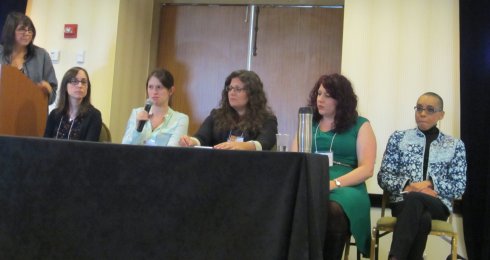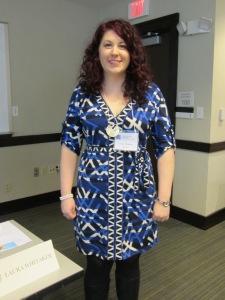Let’s welcome Mindy Alyse Weiss back…she’s got the scoop from the recent SCBWI FL Conference. And boy, what a scoop it is! It’s chocolate fudge with rainbow sprinkles!
Ever wonder about an editor’s wish list? Wonder no longer! In the Editor Panel, Stacy Abrams, Kat Brzozowski, Aubrey Poole, Laura Whitaker and Andrea Pinkney discussed what kind of projects they’re seeking—and not seeking. There seems to be a trend away from dystopian and paranormal novels in YA.

Stacy Abrams, Executive Editorial Director of Bliss and Entangled Teen
Contemporary (no paranormal or dystopian). Can have an issue in it, but the book can’t be about the issue.
Kat Brzozowski, Associate Editor, Thomas Dunne Books, MacMillan
Dystopian is hard. Would love a good YA mystery. Comes across as loving dark but does love girl meets boy and they kiss, light romantic contemporary stuff for girls.
With social media, if you do one thing well but don’t like another, don’t force it.
Aubrey Poole, Associate Editor, Sourcebooks Jabberwocky and Fire
Loves sci fi, YA, not looking at genre really—it’s the stories that stand out within a genre. More experimenting with format. Read more about her wish list here.
Laura Whitaker, Associate Editor, Bloomsbury Children’s Books
She’s tired of dystopian and paranormal YA. She wants to be immersed in a story so much that she’s physically removed from her own issues. She wants to read about real people. Contemporary, original voice. With MG and YA, networking is important. Do a lot of digital marketing initiatives. You can get a huge impact from doing a blog tour. “Help me help you.”
Andrea Pinkney, Vice-President and Executive Editor, Scholastic
More diversity, African American boys, adventure, mystery, fun. Contemporary stories. *You need to normalize and not make it about the problem, even with something like bi-polar.” She’s interested in a novel with a character who has piercing or a lot of tattoos.

Laura Whitaker, Associate Editor, Bloomsbury
Besides writing a well-crafted story, how do you catch an editor’s attention? Laura Whitaker presented “Dating 101: What Makes YOU Desirable to an Editor”.
Tell her something interesting about your writing journey. What drew you to telling this story? Let her know any cool things you can share about yourself—show what makes you vibrant and unique.
Title—come up with something original that represents your work. If the title is the same when you’re published and there’s a story behind how you arrived at the title, marketing will want it later for a blog/Tumblr piece.
She’ll look at a query for 30 seconds to a minute. First thing should be the hook, then a two sentence synopsis (three if you have to), then info about yourself.
Your website is your calling card—especially for picture books.
Do you tweet out interesting, dynamic tweets? It’s the best way to build connections with other authors, agents, and editors. Twitter is more important for MG and YA.
Interact! Do you write about the process or what you’re working on? Marketing and publicity want to see your social media platform. The more social media, the better—but it is not a substitute for the craft.
Thanks again, Mindy!
Come back on Friday for the rest of the scoop from SCBWI FL. We’ll have vanilla and strawberry for those who don’t like chocolate. (Don’t like CHOCOLATE? Who are you people???)


Today I am wrapping up my series on Indie vs. Traditional Publishing with a post from a very special guest, Sourcebooks editor Aubrey Poole. But if you have any additional questions leave them in the comments and I will do my best to answer or find out.
Thanks for inviting me to be a part of this ever-changing and increasingly important discussion. The rise of the eBook has meant a lot of changes for the publishing industry, and I’m proud to be a part of an organization that has embraced those changes. Sourcebooks is a privately owned independent company that’s gained a reputation for being agile, forward-thinking and willing to experiment. So, we may not quite fall under the category of “traditional” publisher, but we definitely acquire, package, produce, market and sell books, and I’m very happy to talk a little more about what value a Publisher brings to its authors.
I can through a lot of terms at you about each piece of the publishing process, like so:
But I’m going to break it down to one core idea: Discoverability.
What does discoverability mean? How readers find your book. If they don’t know about it, they can’t buy it (or check it out), and they can’t read it. So, the billion dollar question is: how will readers find your book?
With the close of Borders and the increasing popularity of eReaders, brick-and-mortar stores are gradually decreasing in number, limiting the opportunity for chance discovery. It’s becoming less common for readers to be browsing a shelf to find their next must-read and more important for publishers (or self-published authors) to find ways to bring attention to their books.
So, essentially, a Publisher’s job is to connect authors to readers.
This is done in a variety of ways from creating eye-catching book covers (that look good as thumbnails), to writing intriguing jacket copy, to placing ads in magazines, to sending ARCs (advance readers copies) to bloggers, reviewers, booksellers and librarians, to booking spots on TV or NPR, to purchasing advantageous placement in Barnes and Noble (those front-of-store table displays aren’t free!) to making sure the metadata (title, author, pages count, age level, etc.) is sent to Amazon correctly, and more.
With all of the noise out there (347,178 new books published in 2011 in the U.S. alone), it’s a Publisher’s job to make your book be heard.
What about Amanda Hocking and E.L. James, you ask? Didn’t they become successful, bestselling authors without a “traditional” publisher? Yes! They are part of the lucky few whose self-published eBooks got that magical word-of-mouth momentum combined with low price points that shot them to the top of the bestseller lists. But for every success story, there are thousands of self-published authors you’ve never heard of and likely never will. And, you may have noticed, both Hocking and James turned to “traditional” publishers to take their eBook phenomena and publish them in print to reach an even wider audience.
So, what does this all mean for you, the writer? Self-publishing is a fantastic new and growing option that will become an important part of the publishing sphere and allow for more and easier access to information than ever before. And for some authors, it will be the right fit. I think it will be especially important for authors of controversial, innovative or niche subjects and genres fast converting to eBooks (like romance!). But in my opinion, a Publisher is still a writer’s best bet when it comes to finding an audience for you book.
Bio:
Aubrey Poole got her start as an editor correcting her friends’ grammar in high school, an effort which naturally guaranteed instant popularity. After a brief internship in the marketing department at Penguin UK, she started her first real job as a news assistant at The Real Estate Journal in Los Angeles. But when she was offered a position as a reporter, Aubrey thought it would be less scary to move cross-country to New York City and try to break into the book publishing industry.
Aubrey is now an associate editor at Sourcebooks, acquiring children’s books from picture books through young adult. Her first YA novel, Send by Patty Blount, was a Junior Library Guild pick, and she hopes to continue shamelessly courting librarians with her forthcoming middle grade novel The Ninja Librarians.






Thank you, Tara for posting this. This was a meaty one!
Awesome, Mindy. Thanks, once again! Thanks, Tara for featuring Mindy.
More great advice!
Thanks for sharing reflections from the editor panel. What useful tips!
You’re welcome, Tina.
Thanks for all your sweet comments. I’m glad you enjoyed the editor panel info!
Thank you Tara, for letting me visit your blog again.